Rafael Dowsley
Large Language Models for Cryptocurrency Transaction Analysis: A Bitcoin Case Study
Jan 30, 2025



Abstract:Cryptocurrencies are widely used, yet current methods for analyzing transactions heavily rely on opaque, black-box models. These lack interpretability and adaptability, failing to effectively capture behavioral patterns. Many researchers, including us, believe that Large Language Models (LLMs) could bridge this gap due to their robust reasoning abilities for complex tasks. In this paper, we test this hypothesis by applying LLMs to real-world cryptocurrency transaction graphs, specifically within the Bitcoin network. We introduce a three-tiered framework to assess LLM capabilities: foundational metrics, characteristic overview, and contextual interpretation. This includes a new, human-readable graph representation format, LLM4TG, and a connectivity-enhanced sampling algorithm, CETraS, which simplifies larger transaction graphs. Experimental results show that LLMs excel at foundational metrics and offer detailed characteristic overviews. Their effectiveness in contextual interpretation suggests they can provide useful explanations of transaction behaviors, even with limited labeled data.
Training Differentially Private Models with Secure Multiparty Computation
Feb 05, 2022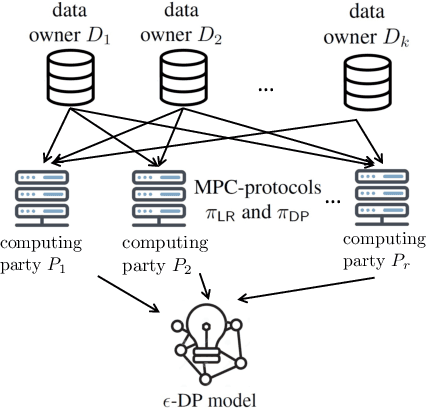



Abstract:We address the problem of learning a machine learning model from training data that originates at multiple data owners while providing formal privacy guarantees regarding the protection of each owner's data. Existing solutions based on Differential Privacy (DP) achieve this at the cost of a drop in accuracy. Solutions based on Secure Multiparty Computation (MPC) do not incur such accuracy loss but leak information when the trained model is made publicly available. We propose an MPC solution for training DP models. Our solution relies on an MPC protocol for model training, and an MPC protocol for perturbing the trained model coefficients with Laplace noise in a privacy-preserving manner. The resulting MPC+DP approach achieves higher accuracy than a pure DP approach while providing the same formal privacy guarantees. Our work obtained first place in the iDASH2021 Track III competition on confidential computing for secure genome analysis.
Privacy-Preserving Training of Tree Ensembles over Continuous Data
Jun 05, 2021



Abstract:Most existing Secure Multi-Party Computation (MPC) protocols for privacy-preserving training of decision trees over distributed data assume that the features are categorical. In real-life applications, features are often numerical. The standard ``in the clear'' algorithm to grow decision trees on data with continuous values requires sorting of training examples for each feature in the quest for an optimal cut-point in the range of feature values in each node. Sorting is an expensive operation in MPC, hence finding secure protocols that avoid such an expensive step is a relevant problem in privacy-preserving machine learning. In this paper we propose three more efficient alternatives for secure training of decision tree based models on data with continuous features, namely: (1) secure discretization of the data, followed by secure training of a decision tree over the discretized data; (2) secure discretization of the data, followed by secure training of a random forest over the discretized data; and (3) secure training of extremely randomized trees (``extra-trees'') on the original data. Approaches (2) and (3) both involve randomizing feature choices. In addition, in approach (3) cut-points are chosen randomly as well, thereby alleviating the need to sort or to discretize the data up front. We implemented all proposed solutions in the semi-honest setting with additive secret sharing based MPC. In addition to mathematically proving that all proposed approaches are correct and secure, we experimentally evaluated and compared them in terms of classification accuracy and runtime. We privately train tree ensembles over data sets with 1000s of instances or features in a few minutes, with accuracies that are at par with those obtained in the clear. This makes our solution orders of magnitude more efficient than the existing approaches, which are based on oblivious sorting.
Round and Communication Balanced Protocols for Oblivious Evaluation of Finite State Machines
Mar 20, 2021Abstract:We propose protocols for obliviously evaluating finite-state machines, i.e., the evaluation is shared between the provider of the finite-state machine and the provider of the input string in such a manner that neither party learns the other's input, and the states being visited are hidden from both. For alphabet size $|\Sigma|$, number of states $|Q|$, and input length $n$, previous solutions have either required a number of rounds linear in $n$ or communication $\Omega(n|\Sigma||Q|\log|Q|)$. Our solutions require 2 rounds with communication $O(n(|\Sigma|+|Q|\log|Q|))$. We present two different solutions to this problem, a two-party one and a setting with an untrusted but non-colluding helper.
Privacy-Preserving Feature Selection with Secure Multiparty Computation
Feb 06, 2021


Abstract:Existing work on privacy-preserving machine learning with Secure Multiparty Computation (MPC) is almost exclusively focused on model training and on inference with trained models, thereby overlooking the important data pre-processing stage. In this work, we propose the first MPC based protocol for private feature selection based on the filter method, which is independent of model training, and can be used in combination with any MPC protocol to rank features. We propose an efficient feature scoring protocol based on Gini impurity to this end. To demonstrate the feasibility of our approach for practical data science, we perform experiments with the proposed MPC protocols for feature selection in a commonly used machine-learning-as-a-service configuration where computations are outsourced to multiple servers, with semi-honest and with malicious adversaries. Regarding effectiveness, we show that secure feature selection with the proposed protocols improves the accuracy of classifiers on a variety of real-world data sets, without leaking information about the feature values or even which features were selected. Regarding efficiency, we document runtimes ranging from several seconds to an hour for our protocols to finish, depending on the size of the data set and the security settings.
Privacy-Preserving Video Classification with Convolutional Neural Networks
Feb 06, 2021



Abstract:Many video classification applications require access to personal data, thereby posing an invasive security risk to the users' privacy. We propose a privacy-preserving implementation of single-frame method based video classification with convolutional neural networks that allows a party to infer a label from a video without necessitating the video owner to disclose their video to other entities in an unencrypted manner. Similarly, our approach removes the requirement of the classifier owner from revealing their model parameters to outside entities in plaintext. To this end, we combine existing Secure Multi-Party Computation (MPC) protocols for private image classification with our novel MPC protocols for oblivious single-frame selection and secure label aggregation across frames. The result is an end-to-end privacy-preserving video classification pipeline. We evaluate our proposed solution in an application for private human emotion recognition. Our results across a variety of security settings, spanning honest and dishonest majority configurations of the computing parties, and for both passive and active adversaries, demonstrate that videos can be classified with state-of-the-art accuracy, and without leaking sensitive user information.
Fast Privacy-Preserving Text Classification based on Secure Multiparty Computation
Jan 18, 2021



Abstract:We propose a privacy-preserving Naive Bayes classifier and apply it to the problem of private text classification. In this setting, a party (Alice) holds a text message, while another party (Bob) holds a classifier. At the end of the protocol, Alice will only learn the result of the classifier applied to her text input and Bob learns nothing. Our solution is based on Secure Multiparty Computation (SMC). Our Rust implementation provides a fast and secure solution for the classification of unstructured text. Applying our solution to the case of spam detection (the solution is generic, and can be used in any other scenario in which the Naive Bayes classifier can be employed), we can classify an SMS as spam or ham in less than 340ms in the case where the dictionary size of Bob's model includes all words (n = 5200) and Alice's SMS has at most m = 160 unigrams. In the case with n = 369 and m = 8 (the average of a spam SMS in the database), our solution takes only 21ms.
Private Speech Characterization with Secure Multiparty Computation
Jul 01, 2020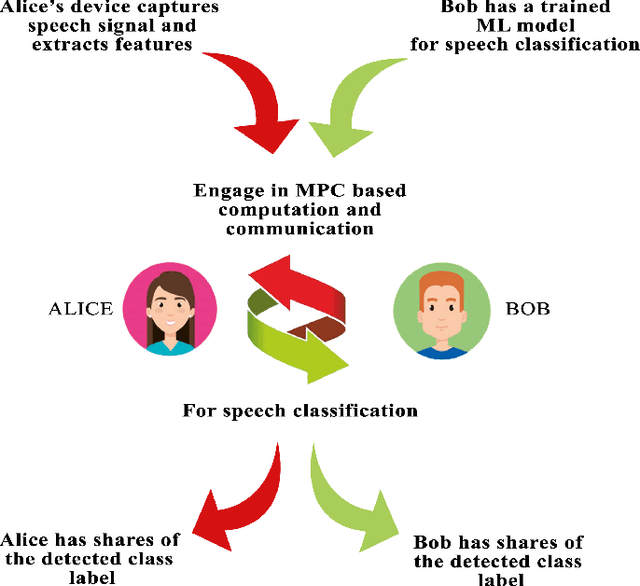
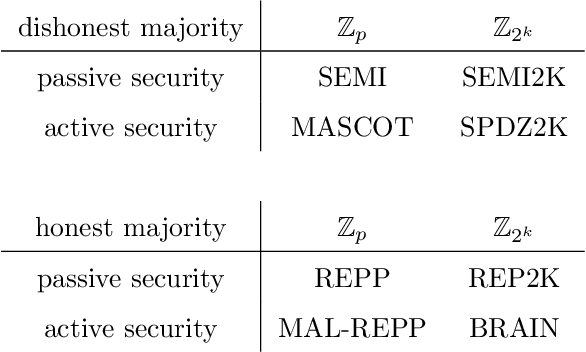


Abstract:Deep learning in audio signal processing, such as human voice audio signal classification, is a rich application area of machine learning. Legitimate use cases include voice authentication, gunfire detection, and emotion recognition. While there are clear advantages to automated human speech classification, application developers can gain knowledge beyond the professed scope from unprotected audio signal processing. In this paper we propose the first privacy-preserving solution for deep learning-based audio classification that is provably secure. Our approach, which is based on Secure Multiparty Computation, allows to classify a speech signal of one party (Alice) with a deep neural network of another party (Bob) without Bob ever seeing Alice's speech signal in an unencrypted manner. As threat models, we consider both passive security, i.e. with semi-honest parties who follow the instructions of the cryptographic protocols, as well as active security, i.e. with malicious parties who deviate from the protocols. We evaluate the efficiency-security-accuracy trade-off of the proposed solution in a use case for privacy-preserving emotion detection from speech with a convolutional neural network. In the semi-honest case we can classify a speech signal in under 0.3 sec; in the malicious case it takes $\sim$1.6 sec. In both cases there is no leakage of information, and we achieve classification accuracies that are the same as when computations are done on unencrypted data.
High Performance Logistic Regression for Privacy-Preserving Genome Analysis
Mar 03, 2020



Abstract:In this paper, we present a secure logistic regression training protocol and its implementation, with a new subprotocol to securely compute the activation function. To the best of our knowledge, we present the fastest existing secure Multi-Party Computation implementation for training logistic regression models on high dimensional genome data distributed across a local area network.
Protecting Privacy of Users in Brain-Computer Interface Applications
Jul 02, 2019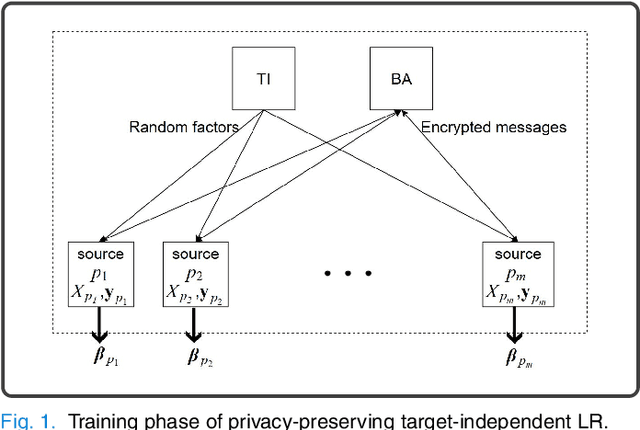
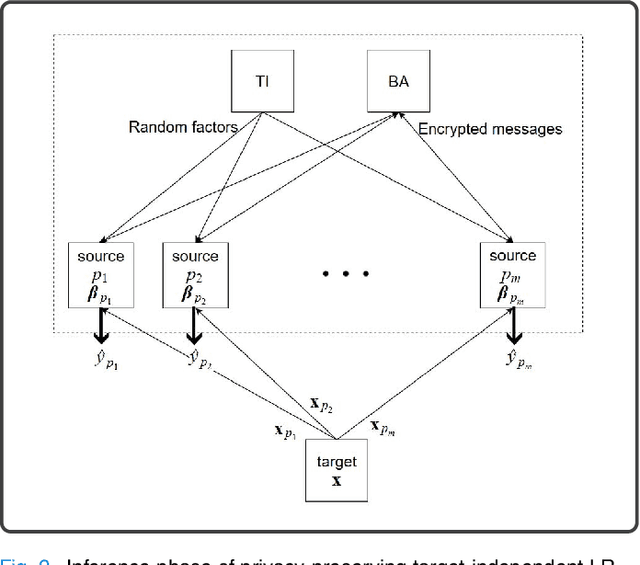
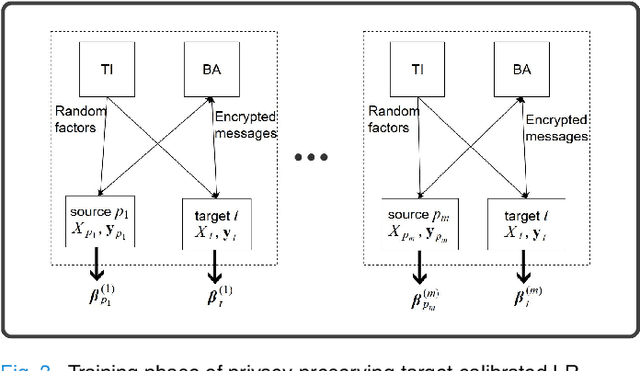
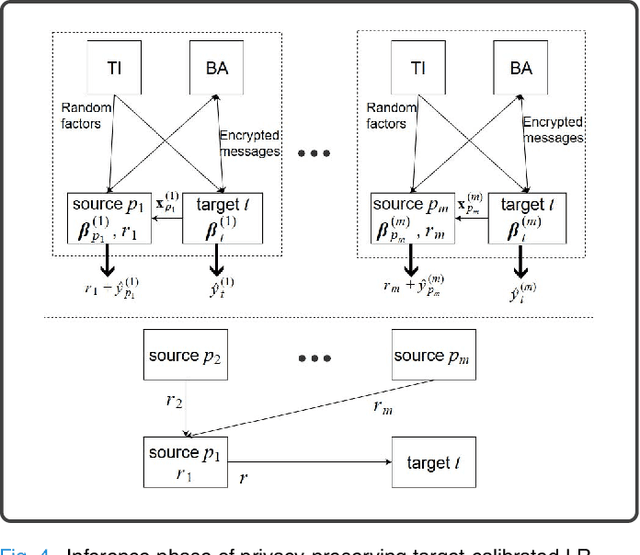
Abstract:Machine learning (ML) is revolutionizing research and industry. Many ML applications rely on the use of large amounts of personal data for training and inference. Among the most intimate exploited data sources is electroencephalogram (EEG) data, a kind of data that is so rich with information that application developers can easily gain knowledge beyond the professed scope from unprotected EEG signals, including passwords, ATM PINs, and other intimate data. The challenge we address is how to engage in meaningful ML with EEG data while protecting the privacy of users. Hence, we propose cryptographic protocols based on Secure Multiparty Computation (SMC) to perform linear regression over EEG signals from many users in a fully privacy-preserving (PP) fashion, i.e.~such that each individual's EEG signals are not revealed to anyone else. To illustrate the potential of our secure framework, we show how it allows estimating the drowsiness of drivers from their EEG signals as would be possible in the unencrypted case, and at a very reasonable computational cost. Our solution is the first application of commodity-based SMC to EEG data, as well as the largest documented experiment of secret sharing based SMC in general, namely with 15 players involved in all the computations.
 Add to Chrome
Add to Chrome Add to Firefox
Add to Firefox Add to Edge
Add to Edge